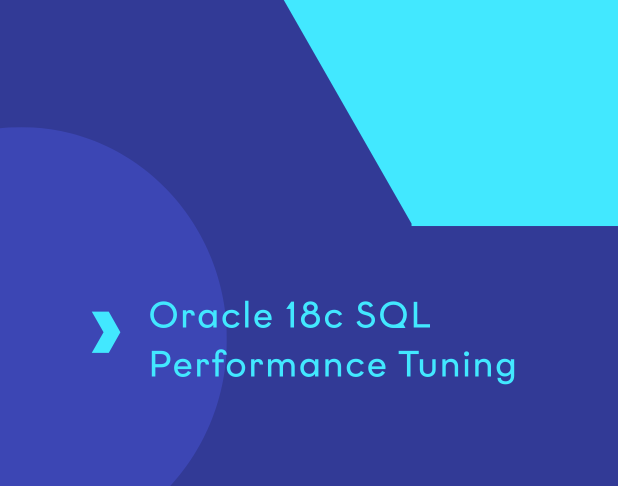Designed for Oracle 18c environments, this two-day practical course equips you with the tools and techniques to enhance SQL efficiency. Through guided exercises, you'll learn how to analyse queries, fine-tune execution, work with indexing strategies, and apply tuning tools to improve database performance.
March sale - up to 50% off training courses – use code: EARLY0326UAE
Oracle 18c SQL Performance Tuning
Select your learning method

Tuning Oracle SQL for better, faster queries
Over just two days, this ILX course will give you a solid grounding in Oracle SQL tuning. Oracle-proficient instructors will guide you through how to use tools, manage statistics and optimise statements so your database and applications work smarter and faster.
- Interpret SQL execution plans for performance insights
- Apply tuning tools to optimise slow queries
- Refine SQL structure for improved efficiency
- Analyse trace output to identify delays
- Build and manage indexes for faster data access
- Detect poorly performing SQL statements
- Use hints to influence execution behaviour
- Understand how the optimiser makes decisions
- Monitor runtime metrics for tuning opportunities
- Examine join and sort operations in SQL
What you’ll learn
On this course, you’ll learn how to analyse and improve SQL performance in Oracle 18c. You’ll work with real examples to identify inefficiencies, adjust queries, manage indexing, and apply tuning tools, gaining the skills needed to optimise performance and resolve issues in live database environments.
Join operations
Learn how different join types affect SQL performance, and how to choose the right one. We’ll cover nested loops, merge joins, hash joins and more, giving you the practical know-how to optimise multi-table queries. You'll also explore less common operations like star joins, anti joins and semi joins. Understanding how joins work under the hood helps you write queries that perform well even as data volumes grow and business logic becomes more complex.
Hints and query control
Oracle gives you tools to gently steer the Optimiser; hints are one of the most effective. We’ll show you how to use them wisely, from influencing join order and access paths to overriding default behaviour when you know better. You’ll see when hints make sense, when they don’t, and how to test the effect they’re having. It’s a great way to take more control of performance without rewriting entire queries.
PL/SQL and SQL interaction
SQL and PL/SQL often work side by side, and that’s where hidden performance costs can creep in. We’ll look at how these two languages interact, how to spot inefficiencies and where tuning PL/SQL can improve overall SQL speed. Topics include bind variables, cursor management and shared pool issues. You’ll get a better sense of how backend logic influences SQL behaviour and how small changes can unlock smoother performance.
- Two days of instructor-led training in a live virtual classroom
- Interactive hands-on live labs
- All relevant course materials
- Certificate of attendance
Key facts
SQL developers, app designers, and tech professionals working with Oracle who need to evaluate and improve SQL query performance.
A working knowledge of SQL is essential. If you're new to Oracle or need a refresher, consider taking our Oracle SQL and Oracle SQL Advanced courses first.
Our experienced trainers and interactive labs create a focused, practical environment – so you can put theory into practice from day one.
FAQs
This course shows you how to improve the way Oracle handles SQL. Through hands-on exercises and real tools, you’ll gain the confidence to diagnose slow-running queries and make targeted changes that enhance database efficiency and responsiveness.
How does the SQL Optimiser work in Oracle 18c?
The Oracle 18c SQL Optimiser automatically determines the most efficient way to execute a query by evaluating multiple execution plans. It uses database statistics and configuration settings to make these decisions, helping to ensure queries are processed quickly and with minimal resource consumption.
What are the best practices for indexing in Oracle 18c?
Effective indexing involves choosing columns with high selectivity, using composite or function-based indexes where appropriate, and reviewing index usage regularly. Avoiding redundant or unused indexes and understanding how indexes affect execution plans are key to maintaining database performance.
Does this course cover joins and sorting performance?
Yes, the course examines how different join operations, such as nested loops, hash joins, and merge joins, affect query execution. It also explores how sort operations consume resources and provides techniques for structuring SQL to minimise unnecessary sorting and improve overall efficiency.
Is this training suitable for application developers?
Definitely. Developers working with Oracle 18c will gain practical skills to improve the efficiency of their SQL code. The course teaches how to structure queries for performance, read execution plans, and apply tuning techniques, all of which are essential for maintaining responsive, scalable applications.
What our customers say

‘The course was particularly good and certainly took my PL/SQL to another level. A lot of extremely useful stuff beyond programming. And certainly gave ideas what is possible. The instructor was particularly good and very knowledgeable and anything he didn't know he would investigate and come with the explanation. That is not my first class with him and one of the reasons I actually book with this company.’

‘John was very knowledgeable about the subject and clearly explained everything.’
Join the half a million learners developing their skills with our training
A trusted partner to thousands of organisations worldwide
Our passionate team goes above and beyond to support customer needs
Please complete the form to ensure your quote is accurate and we will contact you soon.